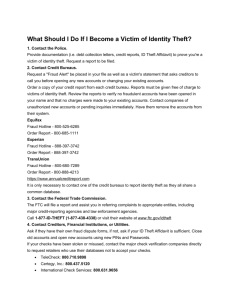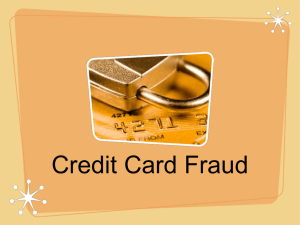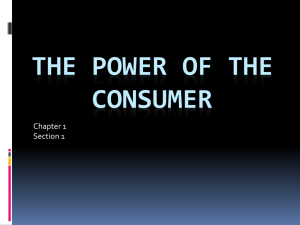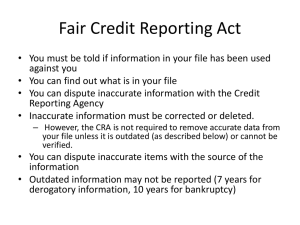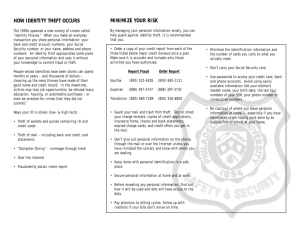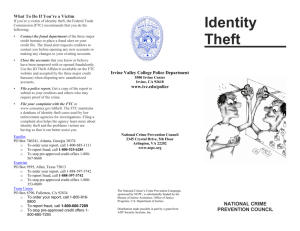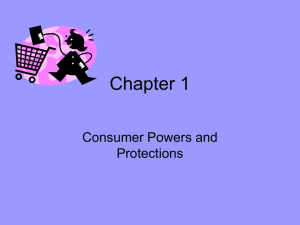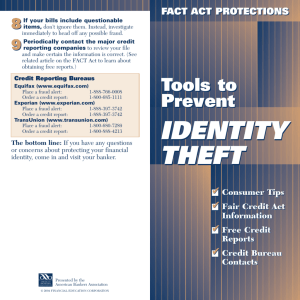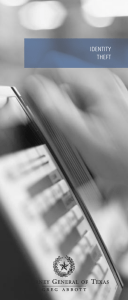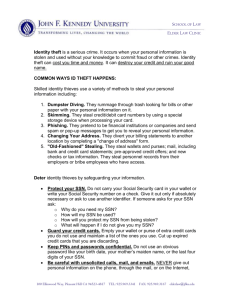Identity Theft brochure
advertisement
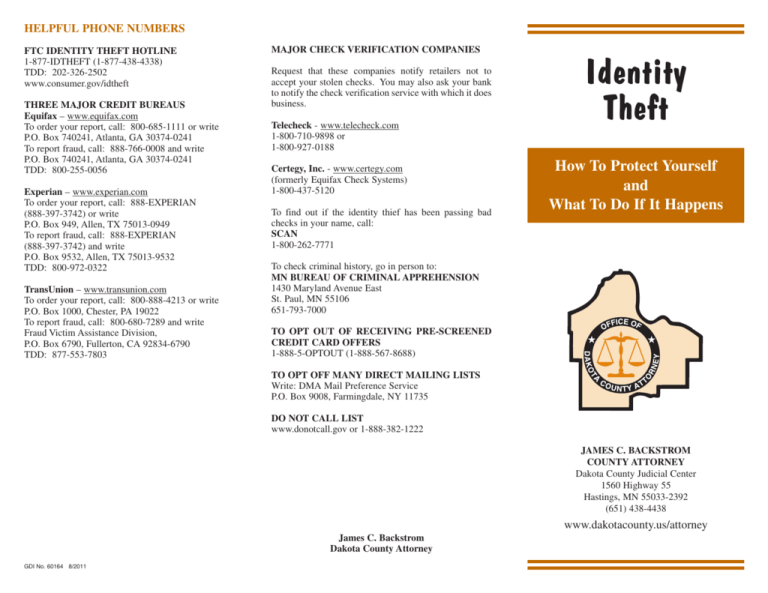
HELPFUL PHONE NUMBERS FTC IDENTITY THEFT HOTLINE 1-877-IDTHEFT (1-877-438-4338) TDD: 202-326-2502 www.consumer.gov/idtheft THREE MAJOR CREDIT BUREAUS Equifax – www.equifax.com To order your report, call: 800-685-1111 or write P.O. Box 740241, Atlanta, GA 30374-0241 To report fraud, call: 888-766-0008 and write P.O. Box 740241, Atlanta, GA 30374-0241 TDD: 800-255-0056 Experian – www.experian.com To order your report, call: 888-EXPERIAN (888-397-3742) or write P.O. Box 949, Allen, TX 75013-0949 To report fraud, call: 888-EXPERIAN (888-397-3742) and write P.O. Box 9532, Allen, TX 75013-9532 TDD: 800-972-0322 TransUnion – www.transunion.com To order your report, call: 800-888-4213 or write P.O. Box 1000, Chester, PA 19022 To report fraud, call: 800-680-7289 and write Fraud Victim Assistance Division, P.O. Box 6790, Fullerton, CA 92834-6790 TDD: 877-553-7803 MAJOR CHECK VERIFICATION COMPANIES Request that these companies notify retailers not to accept your stolen checks. You may also ask your bank to notify the check verification service with which it does business. Telecheck - www.telecheck.com 1-800-710-9898 or 1-800-927-0188 Certegy, Inc. - www.certegy.com (formerly Equifax Check Systems) 1-800-437-5120 To find out if the identity thief has been passing bad checks in your name, call: SCAN 1-800-262-7771 Identity Theft How To Protect Yourself and What To Do If It Happens To check criminal history, go in person to: MN BUREAU OF CRIMINAL APPREHENSION 1430 Maryland Avenue East St. Paul, MN 55106 651-793-7000 TO OPT OUT OF RECEIVING PRE-SCREENED CREDIT CARD OFFERS 1-888-5-OPTOUT (1-888-567-8688) TO OPT OFF MANY DIRECT MAILING LISTS Write: DMA Mail Preference Service P.O. Box 9008, Farmingdale, NY 11735 DO NOT CALL LIST www.donotcall.gov or 1-888-382-1222 JAMES C. BACKSTROM COUNTY ATTORNEY Dakota County Judicial Center 1560 Highway 55 Hastings, MN 55033-2392 (651) 438-4438 www.dakotacounty.us/attorney James C. Backstrom Dakota County Attorney GDI No. 60164 8/2011 WHAT IS IDENTITY THEFT? Identity theft occurs when someone steals your personal information, credit cards, checks, or driver’s license and uses those to obtain credit or merchandise in your name. Identity theft also involves using someone else’s identity with intent to commit an unlawful act. Contact the credit departments of any accounts that have been tampered with or opened fraudulently. Check your credit reports at least once a year. You can obtain these free once a year at: www.annualcreditreport.com. Contact the postal service if you think your mail has been stolen. If you have been the victim of an identity theft, check your criminal history to clear up any arrest or conviction records in your name caused by someone using your name as an alias. HOW DOES IDENTITY THEFT HAPPEN? WHAT CAN I DO TO REDUCE MY RISK OF IDENTITY THEFT? Purses and wallets may be stolen. Cancel unused credit cards. Mail may be stolen including new check orders, bank and credit card statements, and pre-approved credit offers. Don’t carry your Social Security card, passport or birth certificate with you except when necessary. Your trash may be rummaged through for personal information. Shred all credit card receipts, solicitations, cancelled checks and other financial documents before throwing them away. WHAT SHOULD I DO IF IT HAPPENS? Contact your local police department immediately. Most fraudulent use of cards or checks takes place within days of being lost or stolen. Contact the Federal Trade Commission (FTC) which has established a centralized complaint and consumer education service for victims of identity theft. They maintain a database that is shared with law enforcement officials worldwide and also with credit bureaus to help correct identity theft related problems. Contact the fraud departments of the three major credit bureaus (see numbers on back). Ask that a “fraud alert” be placed on your name and Social Security number so hopefully law enforcement will be contacted if a business checks with the credit bureau. This will also show up if you use your accounts without changing them, so you may wish to carry a copy of the police report with you to minimize credit hassles for yourself. Before you reveal any personal identifying information, find out how it will be used and whether it will be shared with others. Ask if you can choose to have it kept confidential. Check credit card statements unauthorized purchases. immediately Check on-line bank accounts frequently. Never leave your purse and credit cards unattended at work. Do not leave credit cards, checkbooks, etc. in your vehicle. Everyday transactions require you to share personal information such as your name, address and phone numbers; bank and credit card account numbers; and your Social Security number. Thieves may have access to this information through their regular employment. Fraudulent telephone solicitors may contact you. Do not give your Social Security number unless absolutely necessary. for Don’t give out your Social Security number, mother’s maiden name, or any account information over the phone unless you are sure the caller is legitimate. Have your name removed from lists sold to companies offering pre-approved credit cards. Never write down PINs and passwords—memorize them. If you must keep a written record, do not put it in the same location as your credit or debit cards. Don’t use the last 4 digits of your Social Security number as your PIN. Carry only necessary credit cards and identification information with you. Protect your mail from theft—install a locked mailbox at your residence, do not leave paid bills in your mailbox for pickup, and have your mail held by the post office if you will be away from home. When you order new checks, consider picking them up at the bank rather than having them mailed to your home. Sign the back of a new credit card as soon as you get it. Destroy unwanted cards. Be careful about where you keep personal information in your home, especially if you employ outside help or are having service work done in your home. Request that your name be removed from lists of direct mail and telephone marketers. Pay attention to billing cycles. Contact creditors if bills do not arrive on time. Make sure you are using a secure site when ordering merchandise over the Internet. Be cautious when using bank ATMs or public phones to make long distance calls so that the number you are using cannot be observed by others in the area. Check your credit card when returned to you after a purchase to make sure it is your card. Ask for and destroy carbons used in the transaction. Keep a list handy of phone numbers for all credit cards and financial institutions you may need quickly if your purse or wallet is stolen, including account numbers and expiration dates.
